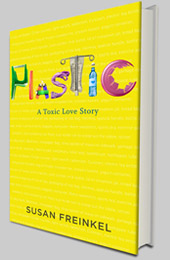If I were a betting person, I’d wager we’ll see a wave of plastic bag prohibitions coming out of California communities over the next year. And I’m guessing that unlike the first round of bag measures that were inspired by San Francisco’s landmark bag ban, these will be better crafted and restrict not only plastic bags, but paper ones as well. I’m envisioning — okay, maybe just hoping — that cities will finally focus on the root problem represented at check-out stands: our reliance on single-use bags and that they will enact laws that really encourage people to switch to reusables.
Anti-plastic bag activists have already been moving in that direction. For instance, the state-wide bag bill proposed in 2010, (and backed by an amazingly broad coalition including environmentalists, grocers, unions and even free-marketeers like former Gov. Arnold Schwarzenegger), took aim at both plastic and paper bags, with a ban on the former and a fee for the latter. Oregon followed the same tack with its bag bill earlier this year. Big chain grocers like Safeway would prefer to see statewide measures rather than a patchwork of local ordinances. But the resounding defeat of each of those bills suggested that for now, at least, any action on bags is going to have come out of local arenas.
And now California communities have gotten another nudge: the state Supreme Court’s decision upholding a bag ban passed by the small southern California town of Manhattan Beach. That 2008 measure barred retailers from giving out plastic bags; city officials said they were motivated by concerns about litter and plastic bags’ effect on the beach and ocean wildlife. They said they would later come back and pass a measure aimed at limiting paper bags. But no sooner had the ink dried on the new law then a group of bag makers, represented by San Francisco attorney Steve Joseph, sued. Joseph argued — and two lower courts agreed — that the city should have done an environmental impact review (EIR) before passing the ban because it would lead to greater use of paper bags, which also have environmental impacts. Similar suits had already successfully blocked bag bans enacted in Oakland and the small Marin community of Fairfax. And Joseph’s threat to sue any other city that tried to restrict plastic bags led many towns and local activists to shelve plans for bag bans. Few were willing to brave a lawsuit or front the $50,000 to $235,000 it takes to conduct an environmental impact study.
But now the Supreme Court has said that a bag ban may not require an environmental review. In its unanimous ruling Thursday, the court said that “substantial evidence and common sense” supported the city’s position that banning plastic bags in favor of paper bags would not harm the environment.
The ruling makes it easier for many communities to enact some kind of bag restriction. The advocacy group Environment California told the Los Angles Times that there are at least 20 towns with bag laws in the works. Nine communities have already approved plastic bag bans, including San Francisco, Long Beach, Malibu, Santa Monica, Marin County, San Jose and Calabasas, Manhattan Beach and Los Angeles County.
James Moose, attorney for Californians Against Waste, predicted the ruling will change the kind of fight the bag industry has been mounting in local town halls. He told the Times the industry will no longer be able to simply cite generic studies that show the environmental perils of paper bags but have little to do with the community imposing the prohibition on plastic.
The court ruling doesn’t let all towns off the hook, especially bigger cities contemplating bans on plastic bags. The court said the legal “analysis would be different for a ban on plastic bags by a larger governmental body, which might precipitate a significant increase in paper bag consumption.” This suggests the most lawsuit-proof policies are ones that aim to restrict consumption of both plastic and paper bags.
It also means some larger communities may be required to do environmental reviews, attorney Moose told the Times. But “each case turns on its own facts,” he said. “This decision makes it more difficult for people in the industry to thwart environmentally benign regulations adopted by communities in California.”
Joseph is not giving up the fight, however. And a story in Plastics News suggests the legal strategy he plans to use in continuing to press his fight on behalf of the Save the Plastic Bag Coaltion.
Joseph argues the decision is specifc only to Manhattan Beach and leaves room to take small, as well as larger cities to court over bag ban proposals. “The court cleared the path to require cities other than Manhattan Beach to do EIRs – under two circumstances,” he told Plastics News. Certainly larger cities have to do EIRs, and he maintains even smaller smaller cities may have to do EIRs because of the build-up of critical mass of smaller and larger cities with plastic bag bans since 2008. He plans to press ahead with suits now pending against Marin County and Long Beach. “This decision is good for the plastics industry and it’s good for the environment. We are delighted and will continue to demand EIRs,” Joseph said.




Respect to article author , some excellent information . “If you don’t leap, you’ll never know what it’s like to fly.” by Guy Finley